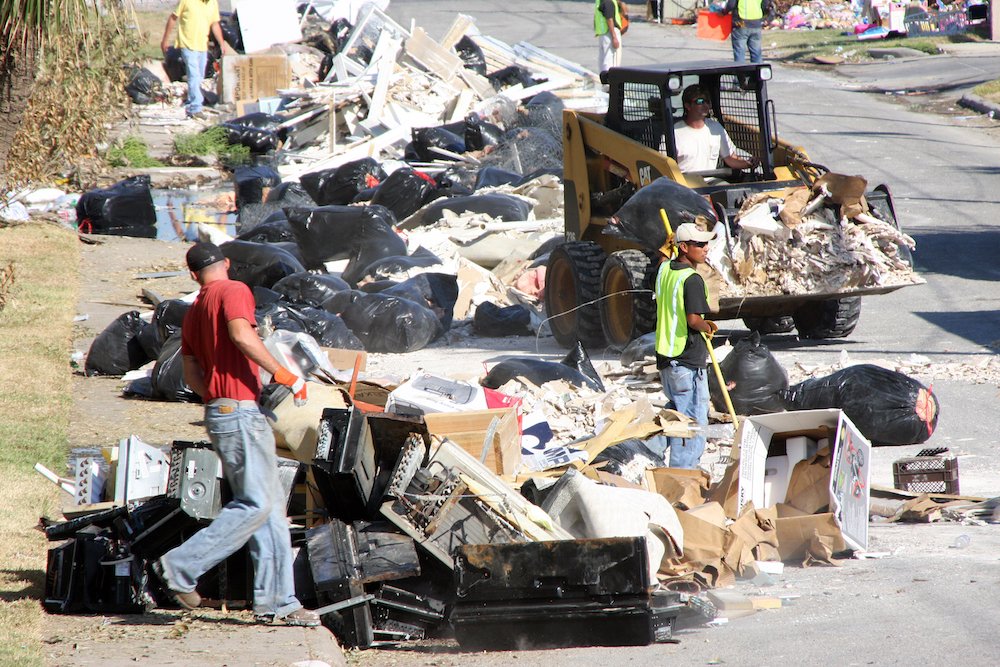What happens to medical waste after a hurricane? Technically, the EPA and FEMA are tasked with cleaning up after national disasters. Biohazardous waste cleanup falls under their jurisdiction. Some critics complain that the EPA has issued waivers after past hurricanes, temporarily exempting local officials from the law. Consideration of the scope of the problem may give those critics second thoughts. For example, Hurricane Harvey generated nearly ten million cubic yards of total waste in Houston alone. Churned amid all that waste are individual bits of medical waste such as needles, bandages, pipettes, and surgical tubing. Add in the raw sewage and toxic chemicals liberated by floodwaters, and it becomes hard to tell “non-regulated” waste from the biohazards.
What’s in the Water After a Hurricane?
Images of rescuers braving a flood never paint the full picture. The air those rescuers breathe often carries an overpowering stench of sewage and diesel. Worse, the water is brimming with microbes and the risk of infection is quite high. Toxic chemicals, industrial waste, fuel oil, and even medical waste all get swept up together in the chaos of a hurricane flood. Needles, bandages, human tissue, and other medical wastes can be carried miles from their point of origin on floodwaters. After the destruction, survivors face grave danger in the form of biohazardous waste left behind.
FEMA and the EPA Clean Up Medical Waste After Hurricanes
In the aftermath of a hurricane like 2017’s Hurricane Irma or Hurricane Harvey, the Federal Emergency Management Agency (FEMA) and the EPA generally partner to clean up the debris. This includes medical waste displaced by flooding or cut off from normal treatment procedures by damage to infrastructure. There’s nothing routine about hurricane cleanup. That said, some critics claim that medical waste cleanup after hurricanes includes dubious practices like granting waivers for in-place hazardous waste laws.
Four Tales of Hurricane Medical Waste Woe
The stories below were culled from the headlines of post-hurricane destruction. They illustrate the devastation a major storm can wreak on a community’s ability to cope with medical waste. From unearthed coffins floating through town to mountains of untreated medical waste drying in the sun, a natural disaster can grind even waste collection to a halt.
Coffins Floating Through Town
Hurricane Harvey hit Texas with 130 mph winds and over 40 inches of rain. Just to give an idea how much water that is, if the temperature were below freezing, it would be about 40 feet of snow. That’s enough to completely bury most mid-sized towns. The disaster created an estimated 8 million cubic yards of solid waste in Houston. Medical waste is almost certainly mixed into that monstrous waste pile. Consider that after 2005’s Hurricane Katrina, full coffins literally floated through neighborhoods. The devastation of a hurricane can undo all the sorting and containering we in the healthcare industry so painstakingly do. A toxic soup almost always results.
50,000 Pounds of Hurricane Medical Waste
After Hurricane Maria in 2017, the EPA found approximately 50,000 pounds of untreated medical waste in a single hospital waste storage facility in St. Croix. According to an EPA report, the waste still required treatment at the time of the inspection. Maria devastated the U.S. territory in September as one of the ten most powerful hurricanes ever recorded. It destroyed homes and infrastructure, pulling down almost every utility pole on the island.
Find Out How Much You Can Save Instantly.
Try our on-line savings calculator.
Medical Waste Containers “Orphaned” by Hurricanes
In the aftermath of 2017’s Hurricane Maria, the EPA partnered with FEMA in the U.S. Virgin Islands to assist in hazardous waste cleanup. The efforts addressed the disposal of “orphan containers,” some of which contain dangerous medical waste. The devastating storm left behind hazardous household waste, e-waste (ruined electronic products) and medical waste. On U.S. soil, FEMA and the EPA handle the sensitive cleanup of medical waste after a major disaster.
Untreated Medical Waste in Landfills
According to WIRED, Hurricane Katrina left behind shocking stories of medical waste mismanagement. The publication cites an accusation by Tulane University law professor Adam Babich that the EPA dealt with biohazardous waste issues in many cases by issuing waivers. The waivers, he said, effectively let state agencies skirt the law. Babich said it remained to be seen whether Irma’s aftermath would create a similar regulatory sidestep. A PBS documentary after Katrina described the dumping of untreated medical waste in a landfill near a low-income neighborhood.
No Good Solution
Unfortunately, there’s no one-size-fits-all solution to the hurricane medical waste dilemma. Hurricanes and other natural disasters can destroy infrastructure and systems that millions rely on. While the EPA may be criticized for granting waivers during times of disaster, the resources simply don’t exist to separate individual bits of medical waste from millions of cubic yards of solid waste in one city alone. The job is far more difficult than looking for a needle in a haystack. It’s looking for ten thousand needles in 8 million stacks of drywall, computers, couches, and household goods.
Conclusion
Hurricanes disrupt the medical waste treatment process just like they disrupt almost every other system in the regions they affect. Medical waste gets swept up in flood waters just like everything else. There’s often no good way to sort out every bandage or needle from the mountains of waste left behind. Solid “non-medical waste” left by hurricanes is often itself contaminated with sewage and mold, further blurring the lines.
A reliable, national waste disposal company can lend a hand. MedPro Disposal’s predictable rates have helped countless health care professionals process their medical waste safely and cost-effectively, in full compliance with all regulations.
Find Out How Much You Can Save Instantly.
Try our on-line savings calculator.
Sources:



